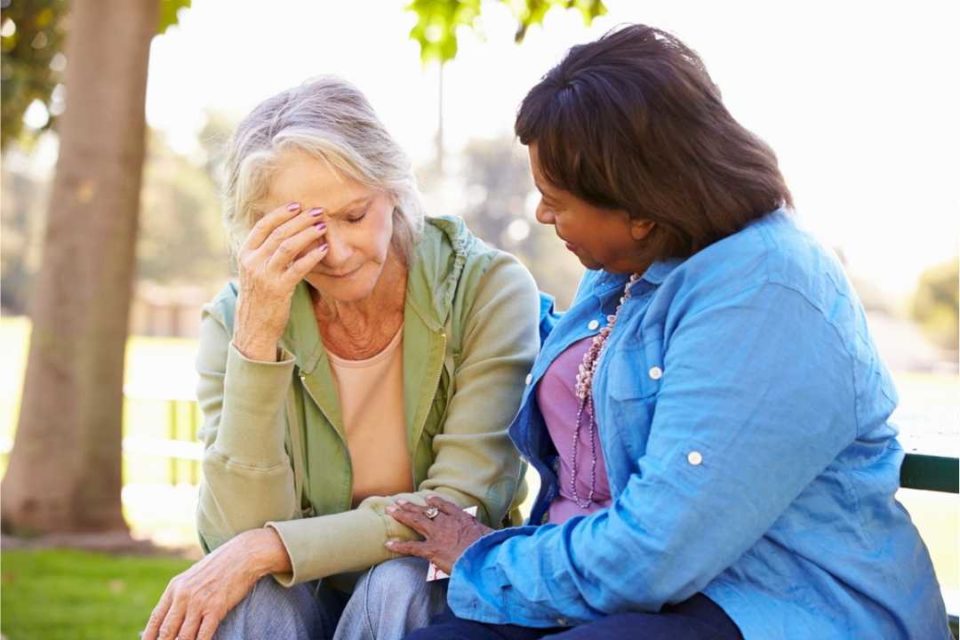March 13, 2017
Understanding Unresolved Grief: What is It? What are the Signs? How is It Treated?
Written by Rachel Eddins
Posted in Trauma, Grief & Loss and with tags: grief and loss, grief counselling

The 2001 terrorist attack on the World Trade Center, Hurricane Ike hitting Galveston and Houston in 2008, or the repeated wildfire blazes in California – all examples of devastating events that cost a lot of lives and caused massive loss and grief for many.
In today’s world, there are more things aside from old-age that rob people of their loved ones.
Everyone experiences losses in their lifetime. As a result, everyone also experiences grief. While many commonalities exist between our personal stories, there can be huge differences, too. For example, no two people grieve the same. This is probably a good thing. Each of us needs to feel what we need to feel like a unique individual. There is no one way—no “right” way—to mourn.
That said, there can be aspects of grieving that are unhealthy. This concept is usually called “complicated grief.” No one does this on purpose, but it can sneak up on you without you even realizing it.
Grief is a common experience of all humankind.
For most of us, grief is a period of sorrow and distress that gradually eases as we accept our loss and move on. Grief is an experience of reaching for someone or something familiar to find that they are no longer there. It’s the emotions we feel when everything that was familiar changes. Each person experiences grief in a very unique way.
Grief therapy helps to process the loss and move through the grief process in a healthy way. Through active grieving, as time passes, the intense emptiness and pain of grief begins to subside as one moves through the process of grief. Over time, they reach the stage of acceptance, which is an adjustment to the new reality of the loss. This is a process of integration where the trauma of the loss is resolved.
Slowly, they return to normal life activities (even though they may still be recovering from the loss). When you experience a loss, your life is forever changed. Yet over time, you can return to living without pain.
For some, though, the loss can cause such immense emotional upheaval that it never ceases – leaving them to suffer from unresolved grief. These individuals might not reach a point of acceptance of the new reality for years and remain stuck.
What is Normal Grief?
I know I just said there’s no one way to grieve. However, there are general categories of this experience that are considered to be normal. Grief is not a linear process, but it can be familiar to anyone who has undergone it. Therefore, there are some symptoms that are deemed normal for anyone who has suffered a loss.
Common symptoms of grief include:
- Frequent crying
- Low energy
- Sleep disturbances
- Appetite changes
- Loss of focus and concentration
- Isolating oneself
- Numbness
- and a roller coaster of emotions
Though grief may look and feel similar to clinical depression, it is not – it’s grief!
More abstractly, while you bereave, you are often under a personal crisis. You may blame yourself or others. Loneliness is common. Life feels empty. Foundational beliefs—from career to spirituality to life goals—will suddenly be questioned.
Keep in mind that normal grief has no timetable, but it is temporary. The hallmark of complicated grief is that it never seems to fade and can prevent you from living a full life.
What Exactly is Unresolved Grief?
Unresolved grief, or complex grief, is different from normal grief in various ways. First, it lasts much longer, at times for many years. Second, it’s much more severe and intense, not lessening with time but instead often worsening. Third, it interferes with a person’s ability to function normally in daily life.
While there are no definite risk factors, it tends to be more common in people who have low self-esteem, feel guilty about the loss, or struggle with their feelings about the deceased. It also tends to affect those experiencing an unexpected and perhaps violent death of a loved one or those suffering from a loss that others don’t readily recognize, such as a miscarriage. Other risk factors include high stress, poor social support, trauma or traumatic grief, and serving as a caregiver to the deceased person.
Whatever the circumstances of the loss, the common thread is that the sufferer tries to deny or avoid the normal aspects of their grief. Most often, they tend to hold on to their loved one and refuse to accept the loss. And this tendency to avoid grief is exactly what hinders the healing process and leads to an unresolved grief reaction.
If you are suffering from grief. Take this quiz and find out.
What are the Signs of Unresolved Grief?
At least at the start, unresolved grief is difficult to tell apart from the normal grieving process. However, in time, certain symptoms emerge that can help you determine if you or someone you know is dealing with unresolved grief. Unresolved grief is an experience of being “incomplete” with a loss.
Signs of unresolved grief in adults and teenagers may include:
- Intense sadness that doesn’t improve with time
- Fond memories turn painful

Grief therapy can help you heal
- Avoid getting close to people (relationship fears)
- Numbness, emptiness, fatigue, digestive issues
- Avoidance of reminders about the loss
- Keeping same routines out of fear of forgetting
- Unwillingness to speak about the loss or acknowledge it
- Obsession and preoccupation and yearning for the person they lost
- Isolation and avoiding contact with other people; feeling detached
- Phobias and anxiety (for adults often about their health)
- Overactivity and intense occupation with a hobby or work or the opposite – lack of interest
- Self-destructive behavior, such as drug or alcohol abuse
- Risky or criminal behavior (most often in teens)
- Guilt, self-reproach, self-blame, panic attacks
- Acquisition of physical symptoms representing identification with the deceased
- Depression with tension, intense bitterness, feelings of worthlessness, and self-accusation
- Suicidal thoughts
Symptoms of unresolved grief in children also may cause:
- Hostility, irritability, or agitation toward someone connected to the death
- Withdrawal and detachment from family, friends, or at school
- Lack of trust in others
- Problems sleeping (fear of being alone at night)
5 Common Symptoms of Complicated Grief & Unresolved Grief
While there are many signs of complicated grief or unresolved grief, the following are the most common symptoms of complicated grief:
1. Obsession
To others, you appear fixated on the person who died. You talk about them constantly. You may even model some of your behavior on what you think they would be doing. This sign may include an attachment to mementos related to the deceased. Just as frequently, you may diligently avoid any such reminders.
2. Profound Sorrow
The sadness never seems to lessen. It colors your actions and perceptions. Subsequently, your outlook on life is one of palpable despair and hopelessness.
3. Intense Anger
The loss has enraged you. If anyone tries to talk with you about it, you become defensive. Your temper is very easily triggered, and people are starting to avoid you. They view you as angry, bitter, and in denial.
4. Unable to Handle Daily Functioning
It could begin with poor performance at school or work. From there, you:
- Stop caring for yourself or your basic hygiene
- Experience weird sleep patterns
- Rarely leave home or interact with others
- Lose interest in activities you once enjoyed
5. Self-Destructive Tendencies
The examples in #4 above escalate. You regularly neglect basic and even minor tasks and chores. This seeming indifference eventually transforms into an impulsive recklessness in your behavior. If you have any preexisting mental health conditions, they get obviously worse. This can escalate to discussions of suicide or even suicide attempts.
Some of the Risk Factors For Complicated Grief
It can be virtually impossible to know in advance if someone is likely to experience complicated grief. However, research shows us that there are some possible risk factors that could play a role. Anyone who is already struggling with a mental illness or substance abuse problem should strongly lean on their support system.
Other factors relate more specifically to the death or deaths:
- If the person died suddenly and unexpectedly
- More than one death occurs in a short time period
- Witnessing the death
- Being very dependent on the person who died
All losses and all grief can be difficult. This process can be made a little more bearable and meaningful with the help of an experienced therapist. You do not have to travel this road alone.
What is the Treatment for Unresolved Grief?
Grief counseling can help you heal no matter what type of grief you’re experiencing. It can help you move through the stages of grief with supportive guidance vs. getting stuck. But for those with unresolved grief, it is especially helpful.
Grief therapy usually encompasses:
- Understanding grief reactions and unresolved/complicated grief symptoms
- Cognitive behavioral techniques that explore and process obsessive thoughts and emotions and address trauma and stress symptoms
- Role playing imagined conversations with the deceased and explaining the circumstances of their death and possible feelings of guilt
- Exploring happy memories about the loved one and reducing avoidance of the topic
- Adjusting to the loss by improving coping skills, reducing feelings of guilt and blame, and eventually redefining life goals
- Learning skills to safely process emotional reactions vs. stuffing them
- Re-establishing relationships and connection with valued life goals
Coping Skills that Help
- Join a support group
- Add self-care behaviors: nutritious eating, movement, getting enough rest
- Stay connected with family and friends
- Plan ahead for anniversaries and reminders of the loss
- Get involved in spiritual activities
- Process emotional pain (with a therapist, spiritual advisor, journal) vs stuffing it
Read more about one therapist’s journey through grief.
Getting help as soon as possible before your grief complicates your life any further is a sensible step. In particular, it is absolutely vital for children who have unresolved grief to receive grief counseling.
Learn more about our loss and grief counseling services. Contact one of our counselors in Houston at 832-559-2622, or schedule an appointment online.
Grounding & Self Soothing
Get instant access to your free ebook.
















